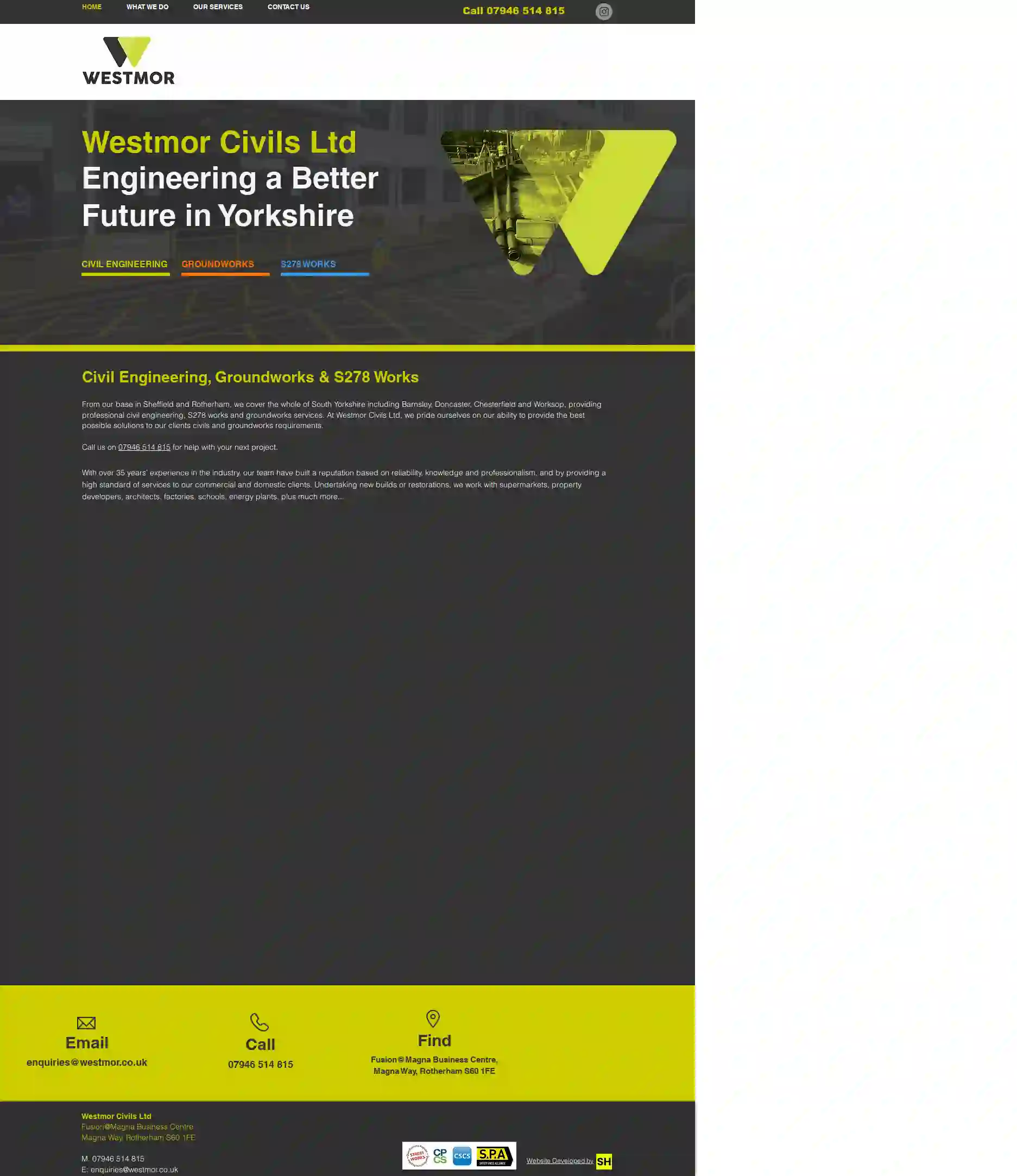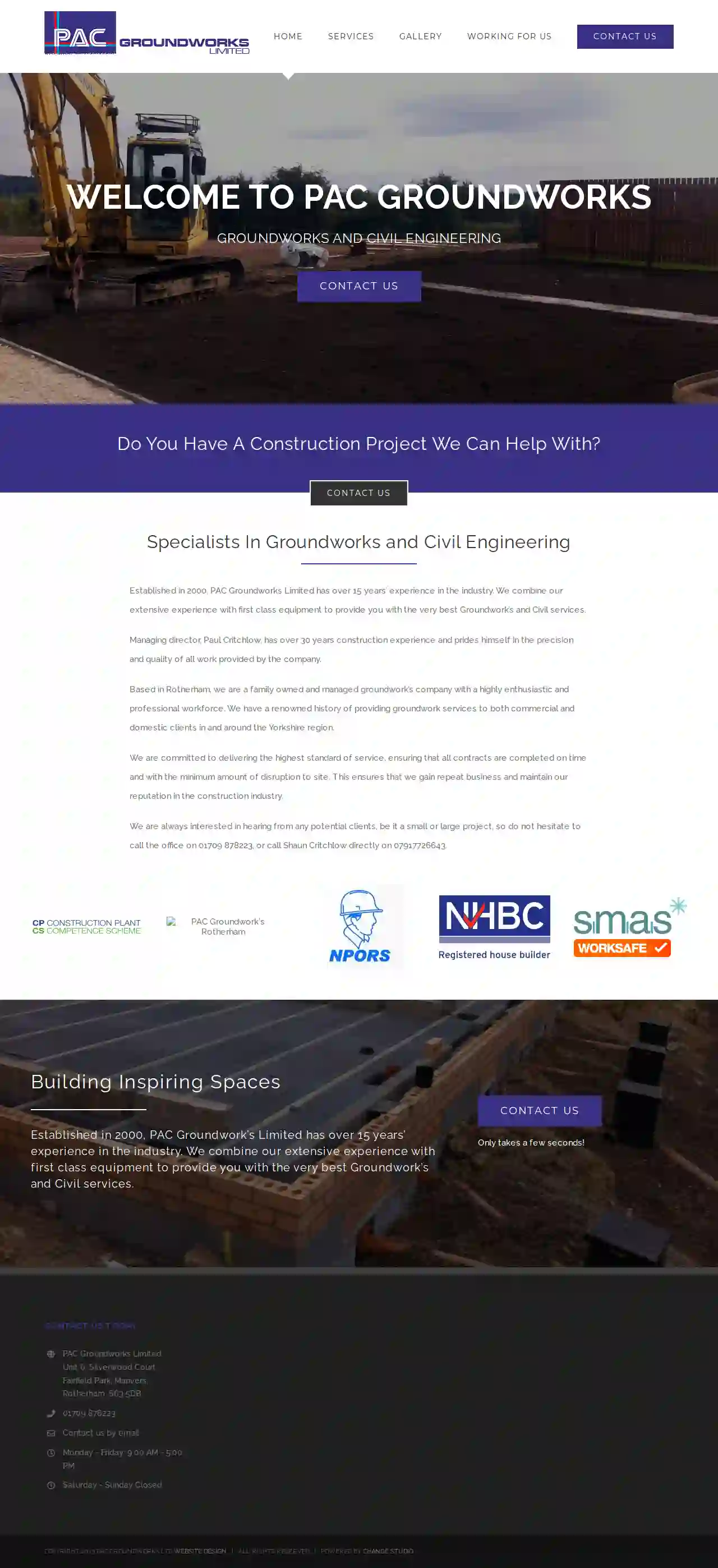Excavation Contractors Rotherham
Best Excavating Contractor in Rotherham
Receive multiple Excavation Companies quotes for your project today! Compare profiles, reviews, accreditations, portfolio, etc... and choose the best offer.

KB Paving & Landscaping
1Based in Rotherham, Rotherham, GBLandscape Gardeners in Sheffield, Rotherham and South Yorkshire Our landscape gardeners at KB Paving & Landscaping offer hard and soft landscaping services to residential clients across South Yorkshire. Guaranteed Landscaping Work Welcome to our new website. Based in Rotherham, KB Paving & Landscaping has been in business since 2015, offering domestic landscaping services to clients in Sheffield, Rotherham and the surrounding areas throughout South Yorkshire. These include hard landscaping services such as Indian sandstone paving, porcelain paving, new driveway installations, new fencing installations, garden gates, and, block paving. Our soft landscaping work covers lawn turfing and seeding, flower bed maintenance, garden clearances, tree planting, and hedge cutting. Customer Loyalty Schemes With almost two decades of experience as landscape gardeners, we understand the importance of providing a top-level service at all times, no matter what project we’re working on. We’re lucky to have a growing base of clients who rely on us regularly to maintain their gardens and outdoor spaces and who also take the time to recommend us to friends and family. We offer a customer loyalty scheme to these residential clients, making us a practical and financially rewarding choice.
- Services
- Why Us?
- Gallery
Get Quote
Mabey Hire Depot - Dewsbury
4.210 reviewsRotherham, GBTrench Struts Trench struts are used to support trench walls during construction, preventing vertical loads from collapsing. Our trench struts are designed for bracing timber walings against trench sheets and are ideally suited for small, shallow trench excavations. View our full range of Groundworks support equipment. Features Safe Working Load - 30kN Available in lengths ranging from 300-1040mm Strut end plates have bent corners - dig into the timber and prevent movement Our Adjustable Trench Struts Our trench struts provide maximum support for trench walls, securely holding shallow trenches in place during construction. This helps create a safe working environment, protecting workers from potential hazards such as trench wall collapse. Ideally suited for small, shallow trench excavations, our trench struts are fully adjustable to fit your requirements. This makes our struts easy to install, with a lightweight design that makes handling a breeze. Our trench struts are complete with a clawed design, helping to hold timber waling in place more securely and prevent unwanted movement. We do not offer engineering designs featuring these products. Hire Trench Struts With a huge range of groundworks support equipment available, hire trench struts from your local depot. Resources Revit BIM AutoCAD User guide Frequently hired together View our extensive range of accompanying groundworks support equipment, including trench sheets available to hire with trench struts.
- Services
- Why Us?
- Gallery
Get Quote- Ro
Rotherham Mini Digger Hire
3.88 reviewsRotherham, GB- Services
- Why Us?
Get Quote 
Bespoke Builders York
1Rotherham, GBAbout South Yorkshire Building Network Your building project deserves the best … Highest standard project management and workmanship Carefully matched to existing building style and materials Compliant with building regulations and codes of practice. Members of the South Yorkshire Building Network can undertake any construction project in South Yorkshire, and nothing is too small or too complicated. Be it renovations, woodwork, bathroom and kitchen fitting, extensions and conversions, plumbing or joinery, our approved panel of building contractors are here to build your perfect home using the latest designs, highest quality materials and all of our expertise! Our experienced builders will complete each stage of your domestic or commercial project, from the conception of the plumbing and heating system to the decorations to complicated electrical wiring. If you are looking for local builders in South Yorkshire, get in touch today. Our members are competitively priced with an excellent track record of customer satisfaction.
- Services
- Why Us?
- Gallery
Get Quote
Westmor Civils ltd
1Fusion@Magna Business Centre, Magna Way, Rotherham, Fusion@Magna Business Centre Magna Way, S60 1FE, GBEngineering a Better Future in Yorkshire From our base in Sheffield and Rotherham, we cover the whole of South Yorkshire including Barnsley, Doncaster, Chesterfield and Worksop, providing professional civil engineering, S278 works and groundworks services. At Westmor Civils Ltd, we pride ourselves on our ability to provide the best possible solutions to our clients civils and groundworks requirements. With over 35 years’ experience in the industry, our team have built a reputation based on reliability, knowledge and professionalism, and by providing a high standard of services to our commercial and domestic clients. Undertaking new builds or restorations, we work with supermarkets, property developers, architects, factories, schools, energy plants, plus much more...
- Services
- Why Us?
- Gallery
Get Quote- Ha
Hallamshire Paving
51 reviewsRotherham, GB- Services
- Why Us?
Get Quote - PS
PSR TurnKey Solutions
1Rotherham, GB- Services
- Why Us?
Get Quote 
ALT Haulage Ltd
4.820 reviewsWest Bawtry Rd, Rotherham, S60 2XL, GBAbout ALT Haulage ALT Haulage is a family-run business established in 2007. We provide a full range of haulage services throughout the UK & Internationally. Based in Rotherham, South Yorkshire, our number one aim is to provide a reliable, efficient, and professional service. All our drivers and crane operators have a number of years of experience. At ALT, we understand the importance of delivering goods to site in perfect condition and on time. We strive to provide this service and go the extra mile to ensure our customers are 100% satisfied. We believe that customer satisfaction is paramount to the success of ALT.
- Services
- Why Us?
- Accreditations
- Testimonials
- Gallery
Get Quote
PAC Groundworks Ltd
32 reviewsUnit 6, Silverwood Court, Fairfield Park, Manvers, Rotherham, Silverwood Court Fairfield Park, S63 5DB, GBWelcome to PAC Groundworks Groundworks and Civil Engineering Established in 2000, PAC Groundworks Limited has over 15 years’ experience in the industry. We combine our extensive experience with first class equipment to provide you with the very best Groundwork’s and Civil services. Managing director, Paul Critchlow, has over 30 years construction experience and prides himself in the precision and quality of all work provided by the company. Based in Rotherham, we are a family owned and managed groundwork’s company with a highly enthusiastic and professional workforce. We have a renowned history of providing groundwork services to both commercial and domestic clients in and around the Yorkshire region. We are committed to delivering the highest standard of service, ensuring that all contracts are completed on time and with the minimum amount of disruption to site. This ensures that we gain repeat business and maintain our reputation in the construction industry. We are always interested in hearing from any potential clients, be it a small or large project, so do not hesitate to call the office on 01709 878223, or call Shaun Critchlow directly on 07917726643.
- Services
- Why Us?
- Our Team
- Gallery
Get Quote- En
Environmental Drainage Solutions Ltd
52 reviewsRotherham, GB- Services
- Why Us?
Get Quote
Over 11,537+ Excavation Businesses onboarded
Our excavation companies operate in Rotherham and surrounding areas!
ExcavationHQ has curated and vetted Top Excavation Contractors near Rotherham. Find a top & reliable business today.
Frequently Asked Questions About Excavation Contractors
- Project Size and Scope: Larger, more complex excavations naturally take longer.
- Soil Conditions: Rocky or challenging soil types can slow down progress.
- Site Accessibility: Limited access might require more time for maneuvering equipment and hauling materials.
- Weather: Inclement weather can cause delays.
- Permitting and Inspections: Waiting for permits or inspections can extend the timeline.
- Clearly Define the Scope: Outline the project's goals, including the excavation area, depth, grade, and intended use.
- Obtain Necessary Permits: Research and acquire any required permits from your local authorities.
- Mark Utility Lines: Contact your utility companies to locate and mark underground utilities to prevent damage.
- Communicate with Neighbors: Inform your neighbors about the project's timeline and potential noise or disruptions.
- Prepare the Site: Clear any obstacles, such as vegetation, furniture, or structures, from the excavation area.
- Discuss Safety Protocols: Review safety procedures with the contractor to ensure a safe work environment.
How long does an excavation project take?
What is the difference between cut and fill excavation?
Cut: Involves excavating soil from an area where the existing grade is higher than the desired grade.
Fill: Refers to using the excavated soil ('cut' material) to raise the grade in an area where the existing grade is lower than desired.
This method minimizes the need to import or export soil, reducing costs and environmental impact. It's commonly used for site preparation, road construction, and landscaping.
What should I do before excavation starts?
What is the difference between topsoil and subsoil?
Topsoil: The uppermost layer, typically rich in organic matter, nutrients, and microorganisms. It's essential for plant growth and is often darker in color.
Subsoil: The layer beneath the topsoil, containing less organic matter and generally denser. It provides support for roots but is less fertile than topsoil.
During excavation, topsoil is often removed and preserved separately for later use in landscaping, while subsoil is typically used for backfilling or other less demanding applications.
How long does an excavation project take?
- Project Size and Scope: Larger, more complex excavations naturally take longer.
- Soil Conditions: Rocky or challenging soil types can slow down progress.
- Site Accessibility: Limited access might require more time for maneuvering equipment and hauling materials.
- Weather: Inclement weather can cause delays.
- Permitting and Inspections: Waiting for permits or inspections can extend the timeline.
What is the difference between cut and fill excavation?
Cut: Involves excavating soil from an area where the existing grade is higher than the desired grade.
Fill: Refers to using the excavated soil ('cut' material) to raise the grade in an area where the existing grade is lower than desired.
This method minimizes the need to import or export soil, reducing costs and environmental impact. It's commonly used for site preparation, road construction, and landscaping.
What should I do before excavation starts?
- Clearly Define the Scope: Outline the project's goals, including the excavation area, depth, grade, and intended use.
- Obtain Necessary Permits: Research and acquire any required permits from your local authorities.
- Mark Utility Lines: Contact your utility companies to locate and mark underground utilities to prevent damage.
- Communicate with Neighbors: Inform your neighbors about the project's timeline and potential noise or disruptions.
- Prepare the Site: Clear any obstacles, such as vegetation, furniture, or structures, from the excavation area.
- Discuss Safety Protocols: Review safety procedures with the contractor to ensure a safe work environment.
What is the difference between topsoil and subsoil?
Topsoil: The uppermost layer, typically rich in organic matter, nutrients, and microorganisms. It's essential for plant growth and is often darker in color.
Subsoil: The layer beneath the topsoil, containing less organic matter and generally denser. It provides support for roots but is less fertile than topsoil.
During excavation, topsoil is often removed and preserved separately for later use in landscaping, while subsoil is typically used for backfilling or other less demanding applications.